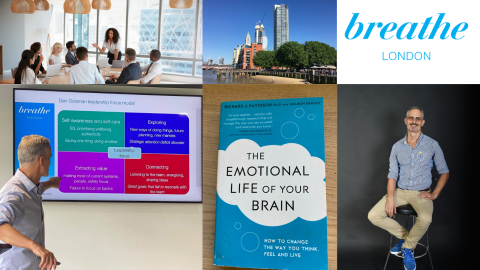
The relaxed brain - resources for understanding and managing our stress with self-compassion
“The emotional life of your brain” by Richard Davidson
This book helped me understand more about the relationship between mindfulness, emotional intelligence and developing our leadership capabilities at work. His work also helped me appreciate that the different range of mindfulness techniques do different things to increase the effectiveness of our brains. So, mindfulness is not one thing!
I, therefore, moulded, and framed parts of our mindfulness at work program in terms of brain gym training. It's important to appreciate that mindfulness is not just about the brain: it is an integrated, intertwined mind, body, brain, environmental and community series of techniques and frameworks centred around Buddhist schools of thought.
However, it is exciting to explore how we can use our minds to train our brains to improve our minds! And to many people, thinking of "brain gym training" is an effective way to introduce people to mindfulness practises.
In this book, Davidson explores what is happening to our brains as we engage in different types of mindfulness activities. And he develops a model of abilities he calls "emotional style". He takes us on a journey of brain enhancement in the following areas:
- Focus
- Emotional regulation/resilience (not sweating the small stuff and bouncing back from setbacks)
- Self-awareness (awareness of the sensations and emotions within our bodies and how these impact our ability to collaborate, communicate and learn)
- Social signal awareness – tuning into others
- Context-awareness – doing and saying the right depending on the context you find yourself in
- Hope and optimism – generally having an optimistic, growth mindset
I've used this six-element framework in many of our emotional intelligence programs.
His more recent book, "Altered Traits", builds on this one and improves upon it. Since publication, research into mindfulness by neuroscientists has improved in leaps and bounds. However, this book helps people appreciate that mindfulness is not one thing. It is a series of complex techniques and frameworks under expert guidance. Not all methods are suitable for each person.
“The compassionate mind” by Paul Gilbert
Gilbert is one of the world’s leading researchers in compassion. In this book, he explores our fight/flight response and the relationship with our inner self-talk dialogue.
Our harsh inner critic drives our attention toward weakness, deficits and threats. He discusses whether this caveman response is adaptive in handling complex challenges, connecting with others and influencing people.
In other sections of our program, we explore our internal narrative and ask you to label, note, and hold this inner dialogue softly. For example, we might speak to ourselves in a manner that we wouldn’t dream of talking to a best friend. So why do we do that to ourselves? And what physiological impact does this have on us when we are self-critical?
He discusses techniques to help hold this self-talk, self-soothe, connect to others, engage our compassionate rest and restore response. Self-acceptance does not mean we don’t want to improve or change our behaviours, but it means doing so with a kinder internal voice.
This book explores how we can be a positive coach to ourselves – working hard, being tenacious, being encouraging and reflecting on achievements and challenges.
Andy Roberts at Breathe London



